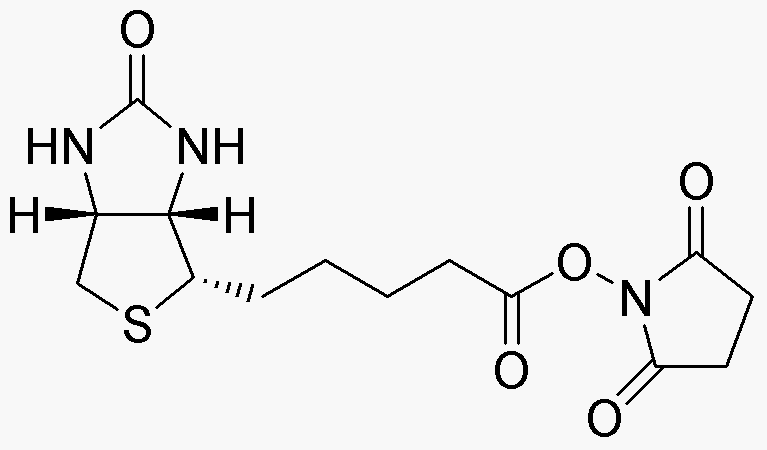Biotin-N-hydroxysuccinimide is widely utilized in research focused on:
- Protein Labeling: This compound is commonly used for labeling proteins in various biochemical assays, allowing researchers to track protein interactions and functions effectively.
- Drug Development: In pharmaceutical research, it aids in the development of targeted drug delivery systems, enhancing the efficacy of therapeutic agents by ensuring they reach specific cells or tissues.
- Diagnostics: Biotin-N-hydroxysuccinimide plays a crucial role in diagnostic kits, particularly in immunoassays, where it helps in the detection of biomarkers for diseases.
- Cell Biology: It is utilized in cell culture studies to facilitate the attachment of cells to surfaces, improving the reliability of experimental results in tissue engineering and regenerative medicine.
- Bioconjugation: This compound is effective in bioconjugation processes, allowing for the attachment of biotin to various molecules, which can enhance the sensitivity and specificity of assays in research and clinical applications.
General Information
Properties
Safety and Regulations
Applications
Biotin-N-hydroxysuccinimide is widely utilized in research focused on:
- Protein Labeling: This compound is commonly used for labeling proteins in various biochemical assays, allowing researchers to track protein interactions and functions effectively.
- Drug Development: In pharmaceutical research, it aids in the development of targeted drug delivery systems, enhancing the efficacy of therapeutic agents by ensuring they reach specific cells or tissues.
- Diagnostics: Biotin-N-hydroxysuccinimide plays a crucial role in diagnostic kits, particularly in immunoassays, where it helps in the detection of biomarkers for diseases.
- Cell Biology: It is utilized in cell culture studies to facilitate the attachment of cells to surfaces, improving the reliability of experimental results in tissue engineering and regenerative medicine.
- Bioconjugation: This compound is effective in bioconjugation processes, allowing for the attachment of biotin to various molecules, which can enhance the sensitivity and specificity of assays in research and clinical applications.
Documents
Safety Data Sheets (SDS)
The SDS provides comprehensive safety information on handling, storage, and disposal of the product.
Product Specification (PS)
The PS provides a comprehensive breakdown of the product’s properties, including chemical composition, physical state, purity, and storage requirements. It also details acceptable quality ranges and the product's intended applications.
Certificates of Analysis (COA)
Search for Certificates of Analysis (COA) by entering the products Lot Number. Lot and Batch Numbers can be found on a product’s label following the words ‘Lot’ or ‘Batch’.
Número de catálogo
Número de lote/lote
Certificates Of Origin (COO)
This COO confirms the country where the product was manufactured, and also details the materials and components used in it and whether it is derived from natural, synthetic, or other specific sources. This certificate may be required for customs, trade, and regulatory compliance.
Número de catálogo
Número de lote/lote
Safety Data Sheets (SDS)
The SDS provides comprehensive safety information on handling, storage, and disposal of the product.
DownloadProduct Specification (PS)
The PS provides a comprehensive breakdown of the product’s properties, including chemical composition, physical state, purity, and storage requirements. It also details acceptable quality ranges and the product's intended applications.
DownloadCertificates of Analysis (COA)
Search for Certificates of Analysis (COA) by entering the products Lot Number. Lot and Batch Numbers can be found on a product’s label following the words ‘Lot’ or ‘Batch’.
Número de catálogo
Número de lote/lote
Certificates Of Origin (COO)
This COO confirms the country where the product was manufactured, and also details the materials and components used in it and whether it is derived from natural, synthetic, or other specific sources. This certificate may be required for customs, trade, and regulatory compliance.


